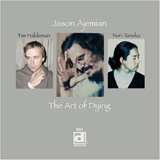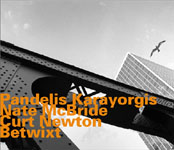Home » Jazz Articles » Extended Analysis » Return to Forever: The Anthology
Return to Forever: The Anthology
But the music of RTF was never meant to be intimate. The high velocity and high volume playing was far more fitting for crowds of thousands than the handfuls of a hundred that fit into most jazz clubs. RTF was big and RTF is back, with its classic line-up—Corea, bassist Stanley Clarke, guitarist Al Di Meola and drummer Lenny White—regrouping, after dissolving in 1977, for a 2008 summer tour that's been the talk of the fusion camp for months. There's little chance of new material but, based on The Anthology, there's more than enough existing music to keep legacy fans and newcomers happy.
While the group first emerged as a Latin-tinged electric band featuring singer Flora Purim and saxophonist/flautist Joe Farrell, it was the shot across the bow of Hymn of the Seventh Galaxy (Polydor, 1973) that got the attention of an entirely new group of fans— and, at the same time, alienated many of the jazz police—many of whom, to this day, still consider the word fusion to be a dirty word. With a new electric guitar-centricity, complex writing, fiery soloing and distortion coming at them from all sides, it's no surprise. And while he'd sadly leave the group not long after its release, from the first notes of his opening guitar solo to the title track, guitarist Bill Connors was immediately thrust into the same league as John McLaughlin, despite an entirely different style. While Corea was the group's primary writer, Clarke contributed one of RTF's most anthemic tracks, "After the Cosmic Rain," with a descending melody that's lost none of its power 35 years later.
But it was with Where Have I Known You Before (Polydor, 1974), and the arrival of Di Meola, that RTF fully secured its place in fusion history. The arguments about who was better—Connors, or Di Meola, who was only 19 when he joined RTF—continue to this day. Connors was more viscerally emotive, but he was also a sloppier player, and only a guitarist with Di Meola's almost unparalleled technique could have kept up with the high speed races of the epic "Song to the Pharoah Kings" or "Beyond the Seventh Galaxy." Where Have I Known You also found RTF moving towards greater groove, with Clarke's seminal "Vulcan Worlds" and White's episodic "The Shadow of Lo."
RTF only recorded four albums, but each introduced something new. No Mystery (Polydor, 1975) was the weakest, yet still possessed a number of important additions to the RTF pantheon, most notably the reintroduction of acoustic bass into Clarke's growing array of instruments. Clarke had emerged as one of fusion's most influential electric bassists, with a combination of powerful groove and dazzling virtuosity that matched his band mates note-for-note. But he'd already proven himself an equally stunning acoustic player before he plugged in, on Purim-era RTF's Return to Forever (ECM, 1972) and the classic Light as a Feather (Polydor, 1972). The all-acoustic title track to No Mystery proved, in addition to monster chops and no shortage of lyricism, that it was possible to bring acoustic instruments into the electric world, with the same energy and fire—just a different complexion.
Sadly, it was the group's first record for Columbia, Romantic Warrior (1976) that was also to be its swan song. Clarke had, at the time, been talking about his respect for progressive rock groups like Yes, and if RTF's previous three albums were both anathema to jazz purists and stunning combinations of challenging writing, increasing groove-centricity and a collective approach to soloing that definitely (but, for many, quite happily) crossed the line into excess on occasion, Romantic Warrior was the closest any band from the jazz side of the jazz/rock equation came to recording a progressive rock album. It was also the group's most compositionally democratic album to date, with Clarke, White and Di Meola contributing one song each to Corea's three.
Still, despite the kind of episodic writing that made the opening "Medieval Overture" one of RTF's most memorable charts, the group hadn't abandoned the acoustic side reintroduced on No Mystery. The title track is an even more involved piece of acoustic fusion, with greater attention to texture and color, and an example of just how funky an acoustic bass can be. White's "Sorceress" is RTF at its get- downest, with Clarke's emergent slapping sound a hand-in-glove partner with White's busy but unerring backbeat. Di Meola's "Majestic Dance" is the closest RTF ever came to rock and roll, while Clarke's "The Magician" was neo-classicism at 150 decibels, featuring no shortage of mind-altering unison lines from Di Meola, Clarke and Corea to keep the energy level high.
While there's no new material, live tracks or alternate takes on The Anthology, it's a generous 2.5 hours of music, with the best four tracks each from Where Have I Known You Before and No Mystery, and Hymn of the Seventh Galaxy and Romantic Warrior both reproduced in their entirety. More than mere remasters from the master tapes (that had already been done with Warrior), the entire two-CD set has been remastered and remixed, providing far greater clarity and punch than previous CD releases—not to mention the ability to hear details that were often buried, especially in the dense and murky production of Hymn.
It's a wise choice. Where Have I Known and, in particular, No Mystery both had their share of songs that weren't up to the standards of the better material, though Where Have I Known only really had one weak track, "Earth Juice," with the rest of the not-included material being three Corea piano solo miniatures. Both Hymn and Warrior, on the other hand, were consistently strong from start to finish. Excising any material from those two discs, in fact, would eliminate the clear beginning, middle and ultimate conclusion that gave both albums a very specific arc. They're also the finest arguments for the strengths and weaknesses of RTF's two guitarists. While there are fans in both camps, it's hard to imagine Warrior with Connors; equally, however, it's unlikely Hymn would have had the same visceral impact had the cleaner, more polished and precise Di Meola been in the group at the time.
The evolution of Return to Forever, as plainly documented on The Anthology, has a certain inevitability about it, even with Romantic Warrior being its final release—it's difficult to imagine the group being able to surpass that final album's compositional breadth, finely tuned group chemistry and improvisational flair. Connors was absolutely the guitarist who, alongside Corea, Clarke and White, was able to bring RTF into the limelight, but it was Di Meola who pushed the group to greater heights. By collecting RTF's two most important albums in their entirety, alongside the best tracks from its other two releases, The Anthology is not just the perfect compilation for newcomers looking for a taste of what they'll hear at RTF's 45-date summer 2008 tour, but a way for those who still have either the original vinyl or CD issues to hear the group the way it was always meant to be heard.
Track Listing
CD1: Hymn of the Seventh Galaxy; After the Cosmic Rain; Captain Senor Mouse; Theme to the Mothership; Space Circus (Part I & II); The Game Maker; Vulcan Worlds; The Shadow of Lo; Return to the Seventh Galaxy; Song to the Pharoah Kings. CD2: Dayride; Sofistifunk; No Mystery; Celebration Suite Part I & II; Medieval Overture; Sorceress; The Romantic Warrior; Majestic Dance; The Magician; Duel of the Jester and the Tyrant Part I & II.
Personnel
Return to Forever
band / ensemble / orchestraChick Corea
pianoStanley Clarke
bassLenny White
drumsAl Di Meola
guitarBill Connors
guitarChick Corea: electric piano (CD1, CD2#1-4), Fender Rhodes (CD2#5-10), acoustic piano, organ (CD1#1-6), Yamaha organ (CD1#7-10, CD2), harpsichord (CD1#1-6), gongs (CD1#1-6), clavinet (CD1#7-10, CD2#1-4), Hohner clavinet (CD2#5-10), synthesizers (CD1#7-10, CD2#1-4), Mini Moog (CD2#5-10), ARP Odyssey (CD2#5-10), snare drum (CD2#1-4), marimba (CD2), vocal (CD2#1-4), Polymoog (CD2#5-10), percussion (CD2#5-10); Stanley Clarke: electric bass (CD1, CD2#1-4), fuzz, bass (CD1#1-6), bell-tree (CD1, CD2#5-10), hand bells (CD2#5-10)), Yamaha organ (CD1#7-10, CD2#1-4)), chimes (CD1#7-10), acoustic bass (CD2), synthesizer (CD2#1-4), vocal (CD2#1-4), Alembic bass with Instant Flanger (CD2#5-10), Piccolo bass (CD2#5-10); Bill Connors: electric guitar and acoustic guitars (CD1#1- 6); Al Di Meola electric guitar (CD1#7-10, CD2), acoustic 12-string guitar (CD1#7-10), acoustic guitar (CD2), soprano guitar (CD2#5-10), hand bells (CD2#5-10), slide whistle (CD2#5-10); Lenny White: drums, percussion (CD1, CD2#1-4), congas, bongos (CD1), marimba (CD2#1-4), timpani (CD2#5-10), timbales (CD2#5-10), hand bells (CD2#5-10), snare drum (CD2#5-10), suspended cymbals (CD2#5-10), alarm clock (CD2#5-10).
Album information
Title: The Anthology | Year Released: 2008 | Record Label: Sony Records
Tags
About Return to Forever
Instrument: Band / ensemble / orchestra
PREVIOUS / NEXT
Support All About Jazz
 All About Jazz has been a pillar of jazz since 1995, championing it as an art form and, more importantly, supporting the musicians who make it. Our enduring commitment has made "AAJ" one of the most culturally important websites of its kind, read by hundreds of thousands of fans, musicians and industry figures every month.
All About Jazz has been a pillar of jazz since 1995, championing it as an art form and, more importantly, supporting the musicians who make it. Our enduring commitment has made "AAJ" one of the most culturally important websites of its kind, read by hundreds of thousands of fans, musicians and industry figures every month.


























